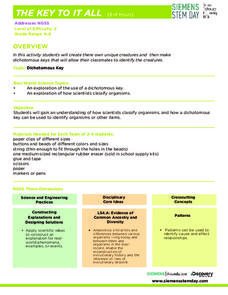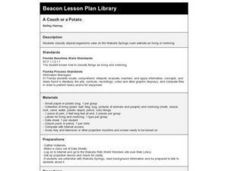Curated OER
Organic Chemistry Worksheet
In this organic molecules worksheet, students classify organic compounds, they name organic compounds using the IUPAC naming system, they complete chemical reactions of organic compounds, and they draw structural formulas of isomers.
Curated OER
Systematics: Classifying Organisms
Students describe the techniques biologists use to classify organisms. In this biology lesson, students create cladograms and phylogenetic trees. They list the levels of taxonomic hierarchy.
Curated OER
Classifying Deep-Sea Organisms
Young scientists access the EARTH Web site in order to engage in this lesson life forms found in the ocean. Student groups of 3 - 4 choose one set of deep-sea organism images. The groups decide how they would classify their organisms and...
Discovery Education
The Key to It All
Which characteristics make organisms unique? Dichotomous keys simplify the process of classifying organisms by focusing on these unique characteristics. Young scholars learn how to use the dichotomous key flow chart by creating their own...
It's About Time
Organic Substances
Host an exciting lab in which learners burn fruit rinds to better understand hydrocarbons. A reading passage and analysis questions wrap up the lesson.
Curated OER
Name that animal
A great way to classify organisms, is by counting the number of legs it has or how it moves. Little ones count the legs on five different creatures, then match the leg count to the proper animal name. Tip: Have them come up with other...
Curated OER
Classify Organisms
In this classify organisms quiz worksheet, students complete an on-line quiz, clicking on questions and matching answers, scoring 1 point for each correct answer. A printed version is available.
Curated OER
Classification Scheme
Fourth graders discuss different classification schemes for living organisms. They group common household items to discover many ways to classify organisms. Students compare/contrast characteristics of each classification.
Curated OER
Keys and Webs
Students explore and classify organisms found in a Rocky Mountain Ecosystem. Through discussions, students examine the effects upon an ecosystem if a component was removed or a new component was added. As a class, they survey reasons...
EngageNY
Mid-Unit Assessment: Classifying and Evaluating Primary Sources
Let's take a walk—a gallery walk. Scholars complete a mid-unit assessment relating to Unbroken by taking a gallery walk to view the various primary source mediums. They then use organizers to select three sources and respond to...
Curated OER
The Four Groups of Biologically Important Compounds
This is not they typical set of teacher instructions. It is an organized chart of the important organic compounds. For each, the involved elements, the name of the building block monomers, the names of polymers, extra information, and a...
Curated OER
Classify the Microbes
Students classify microorganisms into categories based on their characteristics. Pupils use a taxonomic key to identify organisms. They classify certain bacteria, protists, and viruses using a classification or taxonmic key.
EngageNY
Mid-Unit Assessment: Classifying and Evaluating Primary Sources
Let's go for a walk. Learners complete the mid-unit assessment by completing a gallery walk to analyze different primary sources discussed while reading A Mighty Long Way. After viewing the sources, class members complete organizers and...
Curated OER
Classify Machines that Fly!
Eighth graders explore flight and the dichotomous key. In this flight lesson, 8th graders gain understanding of the dichotomous key and create one of their own. Students then use their dichotomous key to classify types of aircraft.
Curated OER
Classifying Objects
Fourth graders classify living things according to similarities and differences through guided and independent activities. They place objects into groups according to their characteristics and then make a collage of living things...
Curated OER
Introduction To the Classification of Organisms
Young scholars discuss how scientists classify organisms. In pairs, they analyze and label "specimens" of breakfast cereals in order to classify them into the correct group. They create a dichotomous key for several species of animals.
Curated OER
Insects?
Can you tell the difference between a bug and an insect? Aren't they the exact same thing? Let your learners explore, identify, classify, and document the differences they see in bugs and insects. The activity sheet suggests several...
Columbus City Schools
Get Your Organisms Organized
From large to small, show your class how to organize them all! Included within the guide is everything you need to take their knowledge of classification from the cellular to the species level. The worksheets focus on...
Curated OER
SORTING ALL SORTS
Students examine how the method of classification is used. In this sorting lesson students take a pre-test, classify organisms and complete a crossword puzzle.
Curated OER
Discovering Dichotomous Keys
Students become familiar with the structure and use of dichotomus keys. They demonstrate a comprehension of the fundamental principles of taxonomy by classifying organisms from a local ecosystem. Students are introduced to the term...
Virginia Department of Education
Classification of Organisms
Searching for the perfect indoor/outdoor activity that allows class members the opportunity to learn about organism classification? Here, pupils research organisms and categorize them according to domain and kingdom over the course...
Scholastic
Study Jams! The Kingdoms of Life
Zoe and RJ discuss the way scientists classify organisms into five kingdoms. Characteristics of each group are highlighted within their conversation and with text. First-time taxonomists can view the animation at home, take the...
Curated OER
A Couch or a Potato
Students classify objects and organisms seen on the Wakulla Springs icam website as living or nonliving.
Curated OER
Classifying Rocks
Fifth graders examine and participate in the process of classifying rocks. In small groups, they sort the rocks into two categories and complete a Venn diagram. Next, they select three rocks, and complete a worksheet that is in the...

























